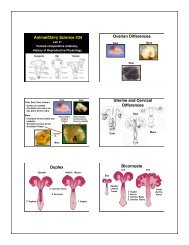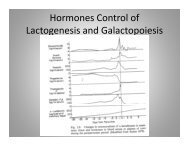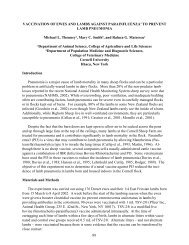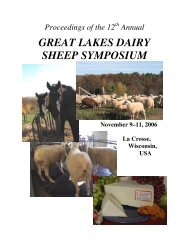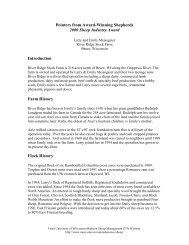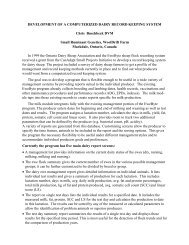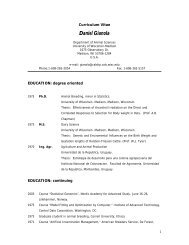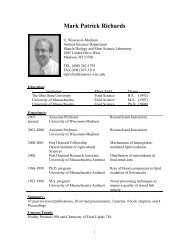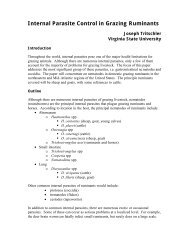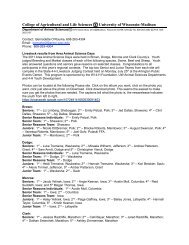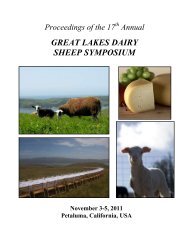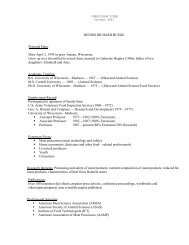Dairy Sheep Symposium - the Department of Animal Sciences ...
Dairy Sheep Symposium - the Department of Animal Sciences ...
Dairy Sheep Symposium - the Department of Animal Sciences ...
Create successful ePaper yourself
Turn your PDF publications into a flip-book with our unique Google optimized e-Paper software.
Monthly Quality Tests<br />
A licensed sampler must collect a representative sample <strong>of</strong> a producer’s milk every month on<br />
a random basis. This sample is analyzed for SCC, SPC and antibiotics. Any 2 out 4 months <strong>of</strong><br />
violative samples for SPC and SCC will generate a warning letter to <strong>the</strong> producer. If <strong>the</strong> violations<br />
continue to 3 out <strong>of</strong> 5 months, <strong>the</strong> grade A permit is suspended.<br />
Any positive result for antibiotics requires that <strong>the</strong> plant reject all shipments <strong>of</strong> milk until <strong>the</strong><br />
milk is found clear <strong>of</strong> antibiotics. The producer must than complete a drug residue prevention<br />
protocol within 21 days for grade A producers and 45 days for grade B producers or suffer permit<br />
suspension and/or license revocation.<br />
Immediate Response<br />
The immediate response level for sheep milk is 1,000,000 SPC per ml, 1,500,000 SCC per<br />
ml. If <strong>the</strong> immediate response levels are reached by a producer, <strong>the</strong> plant has 14 days to obtain a<br />
sample <strong>of</strong> less than 1,000,000 SPC per ml. or 1,500,000 SCC. If this cannot be accomplished, <strong>the</strong><br />
plant must reject all future shipments <strong>of</strong> milk. Any positive drug residue requires that <strong>the</strong> plant<br />
reject milk shipments immediately.<br />
SHEEP<br />
SHEEP MILK PRODUCER GUIDELINES<br />
These guidelines generally follow <strong>the</strong> items listed on <strong>the</strong> DATCP <strong>Dairy</strong> Producer Farm<br />
Inspection form FD-11 (Rev. 9/97)<br />
1. Abnormal Milk<br />
(a) Milk which is ropy, stringy, clotted, thick or abnormal in any way. It includes milk<br />
containing pesticides, insecticides or medicinal agents. Regular equipment may be used<br />
but not until all o<strong>the</strong>r animals are milked.<br />
(b) Abnormal milk must not be squirted on <strong>the</strong> floor, on <strong>the</strong> platform or in <strong>the</strong> producer’s<br />
hand.<br />
(c) Milking equipment used for handling abnormal milk must be washed and sanitized<br />
after such use. Producer should also wash his hands after handling such equipment and<br />
handling <strong>the</strong> teats and udders <strong>of</strong> animals producing abnormal milk.<br />
MILKING PARLOR/AREA<br />
2. Construction<br />
(a) Floors shall be constructed <strong>of</strong> concrete or equally impervious material. Ramps and<br />
platforms used to elevate <strong>the</strong> sheep for milking must be constructed <strong>of</strong> an impervious<br />
material such as steel (wooden platforms and ramps are not allowed). Rubber cow mats<br />
may be used as long as <strong>the</strong>y are not placed over a wooden platform.<br />
(b) Walls and ceilings must be reasonably smooth and be painted or whitewashed or have<br />
o<strong>the</strong>r acceptable finish; shall be kept in good repair and surfaces shall be refinished<br />
whenever wear or discoloration is evident. Ceilings must be dust tight. Hay or straw<br />
chutes must have dust-tight doors which must be kept closed during milking.



